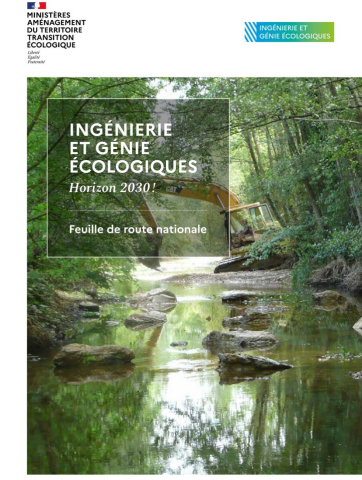We're sure you've already read the whole thing, but just in case...
Here's the link to the Green Engineering Roadmap: https://www.ecologie.gouv.fr/sites/default/files/documents/MTE_DGALN-Feuille-de-route-ingenierie.pdf
It was officially presented by the Ministry for Spatial Planning and Ecological Transition last week, and sets out the sector's priorities for 2030.
Its aim is to ensure that the skills and tools of ecological engineering are used systematically in regional development projects, to preserve and restore biodiversity, to renaturalise areas, etc., while at the same time reinforcing quality requirements for professionals in the sector.
Why this ambition? Because the industry is now in the front line when it comes to meeting the environmental challenges of our time and the regulatory requirements that go with them: protected areas, zero net artificialisation of land, nature-based solutions, water management, adapting to climate change, urban renaturation, invasive alien species, etc.
With this in mind, the roadmap sets out six strategic priorities:
- Mobilising project owners and managers of natural areas
In particular, the aim is to speed up the integration of ecological engineering into the work of local authorities and to better guide public procurement in favour of quality professionals.
- Supporting the economic development of the sector
This means, among other things, better identifying companies in the sector (for example, by creating a dedicated NAF code), or anticipating future changes in professions, practices and related needs (professional know-how, insurance products, seed supply, etc.).
- Training students and upgrading the skills of professionals
With 7,200 vacancies to be filled each year until 2030, this priority aims to promote the professions and related training courses, develop a national network of teachers and experts, and ensure the quality of training courses through a labelling system.
- Drawing on research and innovation
The aim is to continue to improve knowledge, tools and methods to increase the effectiveness of actions on the ground, and to enable France to maintain its position as an international leader in these areas.
- Communicate widely to promote ecological engineering, particularly among public and private players in the regions
- Set up and structure a national governance structure for the industry, covering mainland France and the French overseas territories
And now, as Minister Agnès Pannier-Runacher says in the introduction to this roadmap: "Let's be ambitious; let's make ecological engineering and engineering pillars of France's environmental and economic sovereignty!"
